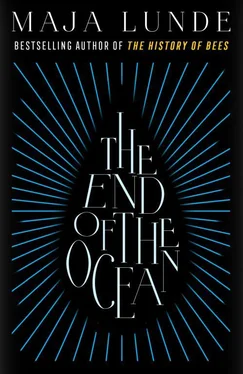The hall was located right behind the sanitary facilities. A huge, run-down factory, divided up into long corridors and small cubicles by old awning cloth that had been hung from the ceiling. Striped yellow, blue and red fabrics, cheerful colors.
There were beds in all the cubicles. Most of them were empty. The floor was clean and the doors were open; a refreshing draft cooled off the hall.
“Look,” I said. “Number thirty-two. That’s ours.”
Our own little nook, with two military-green cots, a metal cupboard and a plastic box for storage. There were sheets on the beds and a bottle of antibacterial handwash for both of us. Maybe there wasn’t enough water for hand washing.
“The walls are made of cloth,” Lou said, and touched the striped awning cloth with her hand.
“Isn’t it nice? Like a theatre,” I said.
“No. Like a tent. It’s like we’re on a camping trip,” Lou said, and finally let go of me.
“This can be our camping table,” she said, and pulled the plastic box out between the beds. “And this is the tablecloth.” She pulled her dirty handkerchief out of her pocket and placed it on top.
I tossed our bag into the cupboard. It occupied only half the space.
Everything we owned, in half a cupboard. I used to own an apartment, a small, flat-screen television, a cell phone, easily fifteen T-shirts, at least seven pairs of pants, eight pairs of shoes, a heap of socks that were never matched and folded in pairs, a table, four chairs, a couch, curtains, cutlery, two good knives, a cutting board, a bed, two children’s beds, an entire shelf of books, a calfskin wallet, two potted plants that Anna took care of, three flower vases, bedding for four, a solid heap of towels, most of them faded from the wash, two warm jackets, three scarves, four hats, five caps, two half-empty bottles of sunblock, shampoo, dishwashing liquid, a dishwashing brush, a toilet-paper rack, cleaning bucket, mop, seven washrags, a changing table, diapers, moist towelettes, two floor mats, a poster with a picture of Manhattan before the last rounds of spring flooding, a wife, two children…
I pushed the door to the cupboard shut.
In the cubicle opposite ours I caught a glimpse of the old man from the line. He was lying down with his face to the wall.
I started making up the beds. The mattresses were thin and wrapped in sticky plastic that smelled of disinfectant. One sheet underneath, one on top. No pillow. Lou could continue using her sweater for a pillow. She had done so during the days we were on the road. She liked rolling something up to put under her head when she slept.
At that moment the man in bed moaned. I could hear him writhing in pain. The bed emitted a metallic squeak. And he wailed. A soft whine of suffering.
I went out into the hallway between the cubicles. The man didn’t notice me. Again he writhed in pain and turned his bandaged hand over.
I ventured into his cubicle. He didn’t react as I drew close to him. The bandage was brown with filth and on one side of it there were yellow stains where puss had oozed out.
He smelled bad. Rancid and a little rotten. All of him or perhaps just from the hand.
He moaned again and opened his eyes, stared straight at me.
“Sorry,” I said. “Didn’t mean to disturb you.”
He sat up. His movements were stiff, his eyes glassy with pain.
“Do you have any…” he asked in French and held up his hand. “Something or other. Just so I can get some sleep?”
I shook my head and pointed at the bandage. “How long has it been since you had that changed?”
At first he didn’t reply. He looked down at the filthy dressing.
“My daughter dressed it.”
“Your daughter?”
“She’s a nurse.”
“But was that long ago?”
“I don’t remember.”
“It has to be changed.”
Fortunately the man didn’t object and let himself be led. I held Lou by one hand, and with the other I guided the man gently forward.
I asked where he came from. What his name was.
Francis, he mumbled in reply. He’d made his way here from Perpignan.
That made me happy.
“We’re almost neighbors,” I said. “We’re from Argelès.”
He didn’t reply, perhaps didn’t think it was very close, and he would be right about that.
Then we reached the first-aid barracks.
No line here. We were admitted immediately and welcomed by a nurse in a bleached white uniform. She smelled of soap.
The room was cool. The air dry. A box on the wall emitted a low humming sound; there was air conditioning in here as well.
Francis sank down into the chair she pulled out for him and placed his hand on her lap. We stood right behind him.
The nurse carefully loosened the bandage and he whimpered. There were tears in his eyes and his face twisted.
As the bandage was slowly unwound, the odor intensified, the stench.
“Go sit over there,” I said to Lou.
For my own part, I couldn’t refrain from watching.
The wound was deep and festering, more yellow than red, a long gash in his flesh. The color of the skin around it was a sickly color, grayish.
“Wait a minute,” the nurse said, and left the room.
A little time passed. I tried talking to Francis, about Lou and me, about how we were supposed to meet my wife here.
He nodded in response, but said nothing about himself.
Finally the nurse returned with a doctor. They had clearly already conferred, because the doctor sat down with the man immediately, took his hand in his lap and studied the wound.
“How did you get this?” she asked softly.
The man looked away.
“I cut myself… on a saw.”
“A saw?”
“I was going to saw some wood. Didn’t have an axe.”
“This is not a cut from a saw,” the doctor said. “It will be easier for me to know what to do if you tell the truth.”
He raised his head and gave her a look of defiance but suddenly relented. “A knife. Three weeks ago yesterday,” he said loudly. “Three weeks and one day.”
“You were lucky,” the doctor said. “Had the cut been an inch or so higher up, it would have hit the aorta.”
“Lucky?” Francis said, and I could hear him swallow. “I don’t know about that.”
“I’m going to give you antibiotics,” the doctor said after a moment. “And you must come in every other day to have the wound cleaned.”
“What’s the point of that?”
“The antibiotics will get rid of the infection.”
“And the point of that?”
“Of what?”
“Getting rid of the infection?”
“Do you want to lose your hand?”
He said nothing more.
The doctor surrendered her seat to the nurse, who poured disinfectant over the wound with expert hands and rubbed in an ointment.
Francis was no longer concerned about hiding his pain. Now he swore energetically.
“Hush. The child!” I said.
“Sorry,” he said.
“That’s OK,” Lou said from her corner. “Daddy says things like that too.”
Francis laughed.
But then the nurse brought another bandage which she wrapped carefully around his hand.
“It’s too tight,” Francis said.
“How’s that?” the nurse tried.
“Still too tight.”
“I’m loosening it now.”
“It feels like it’s stopping all the blood circulation. You’re going to give me gangrene.”
“It must be wrapped snugly.”
“It must be that damn ointment. It stings.”
“When you clean a cut, it’s supposed to sting,” Lou said softly from her corner.
He peered up at her. All of a sudden there was something boyish about him.
“You’re right,” he said. “I’d forgotten about that.” He stared down at his hand wrapped in the white gauze bandage that contrasted sharply with his dirty skin, and said nothing more.
Читать дальше










